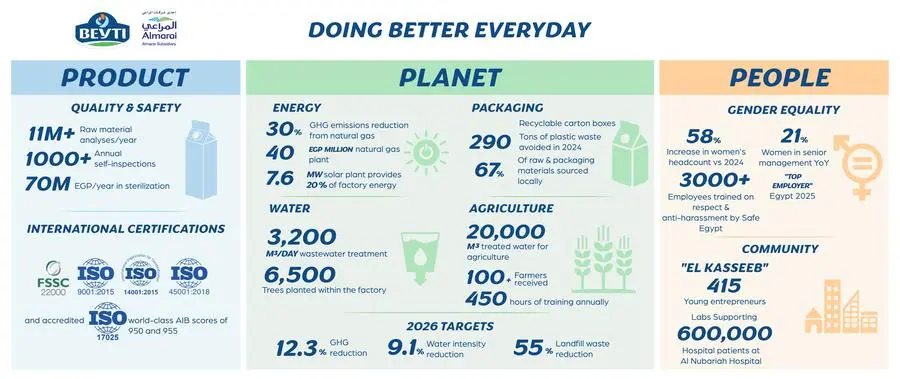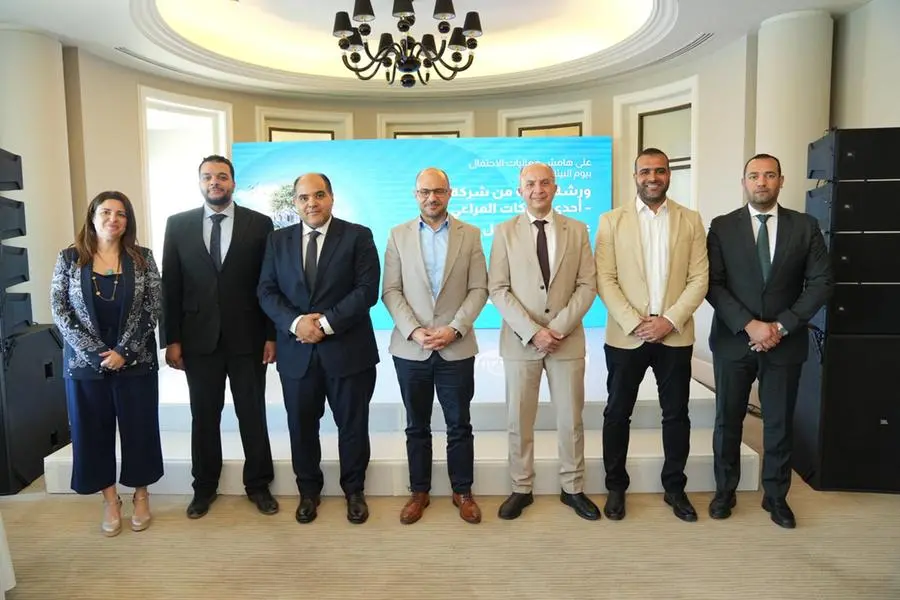PHOTO
Cairo – As part of its ongoing commitment to Sustainability, and on the occasion of World Environment Day, Beyti – an Almarai subsidiary – organized an environmental awareness session for the media. The event aimed to promote environmental consciousness and highlight the vital role of the food and beverage industry, along with the broader industrial sector, in supporting sustainability efforts and building a greener future for Egypt and the region.
The session featured presentations by Eng. Ahmed Kamal Abdel Moneim, Executive Director of the Environmental Compliance Office and Sustainable Development at the Federation of Egyptian Industries and Technical Advisor for Climate Change; Eng. Ahmed Abo El Saoud, Head of Sustainability for North Africa at Tetra Pak; and Eng. Mohamed Kabbany, Head of Sustainability and Value Chain Development at Beyti – an Almarai subsidiary. These speakers offered in-depth insights into Egypt's sustainability efforts and the industrial sector's crucial role. Discussions centered on recycling and reuse of packaging materials, energy transition strategies, and clean energy initiatives, all emphasizing a commitment to circular economic principles and reduced environmental impact.


The session was inaugurated by Mr. Chris Abboud, General Manager of Beyti – an Almarai subsidiary, who stated, “At Beyti, we take pride in viewing sustainability not merely as an environmental obligation, but as a golden opportunity for innovation and growth. Our commitment spans from grass to glass, as we continually enhance our practices to reduce environmental impact and promote positive social impact under our integrated ‘Doing Better Every Day’ strategy relying on our 3 core pillars: Caring for People, Protecting the Planet, and Developing Safe Products. This has resulted in our success in avoiding the production of 290 tons of plastic waste annually in 2024, and our reliance on 67% of raw materials and packaging materials from local sources.”
In this regard, Eng. Ahmed Kamal Abdel Moneim, Executive Director of the Environmental Compliance Office and Sustainable Development at the Federation of Egyptian Industries and Technical Advisor for Climate Change, inaugurated the session by emphasizing the importance of collaboration between the industrial sector and policymakers. He remarked: “Climate change is not only an environmental challenge, but a shared social and economic responsibility that demands collective action. Beyti stands as a model in Egypt’s industrial sector, having successfully integrated sustainability at the core of its operations. This is a true reflection of its commitment to environmental protection and the advancement of a green economy in Egypt. The partnership between government and the private sector is the only path to achieving real and lasting impact.”
Notably, the session reaffirmed Beyti’s leadership in sustainability, emphasizing the company’s dedication to building effective communication channels with the media and highlighting its comprehensive efforts to implement practical, sustainable solutions across every stage of its value chain. The event also served as an open forum for journalists to delve deeper into sustainability issues, enhancing public awareness of the industrial sector’s critical role in tackling environmental challenges.
About Beyti:
Beyti, an Almarai subsidiary, was established in 1998 as a company specializing in food manufacturing. Beyti is a leading company in the Egyptian food sector and is one of the largest producers and exporters of milk, juices, and yogurt in Egypt. Beyti offers its leading products such as Almarai milk, Almarai yogurt, Almarai Treats, Almarai Yogo, Almarai juice, Almarai cream, and Almarai cheese, in addition to Beyti milk and juices.
Beyti's Sustainability Efforts:
Beyti – an Almarai subsidiary – embraces a comprehensive sustainability strategy under the theme “Doing Better Every Day,” built around three core pillars: Planet, People, and Product. This integrated approach reflects the company’s long-term vision to become a leading green brand in Egypt’s food and beverage sector by 2030.
On the environmental front (Planet), Beyti operates the largest solar energy plant connected to the network in the industry, generating 7.6 megawatts and covering up to 20% of the factory’s energy needs. It also manages the largest industrial wastewater treatment facility in the sector, with a daily capacity of 3,200 cubic meters — much of which is reused for irrigation. The company has planted over 6,500 trees, recycled more than 25,000 tons of cardboard, and since 2022, has reduced its plastic waste by approximately 290 tons annually — all as part of its commitment to the circular economy and reducing its environmental footprint.
In terms of social impact (People), Beyti has significantly advanced gender inclusion, increasing the number of female employees by 58% (2024 Vs. 2023), and raising women representation in leadership roles to 21%. The company also trained over 3,000 employees on gender equality and inclusion. Its flagship youth empowerment program, "El-Kaseeb," has enabled 415 young people from 31 governorates, contributing over 15% of the company’s total sales.
When it comes to product excellence (Product), Beyti upholds the highest quality and food safety standards. It conducts over 11 million quality tests annually, runs more than 1,000 inspection campaigns, and invests EGP 70 million each year in sterilizing production lines. The company also complies with global quality certifications, including FSSC 22000, ISO 9001, ISO 14001, and ISO 45001.
To reinforce its sustainability journey, Beyti signed a sustainability-linked loan agreement with HSBC, setting clear targets to reduce greenhouse gas emissions by 12.3%, decrease water consumption by 9.1%, and cut waste by 55% by 2026. These efforts reaffirm Beyti’s role as a responsible industry leader committed to delivering trusted products while creating a measurable positive impact on both society and the environment.




















